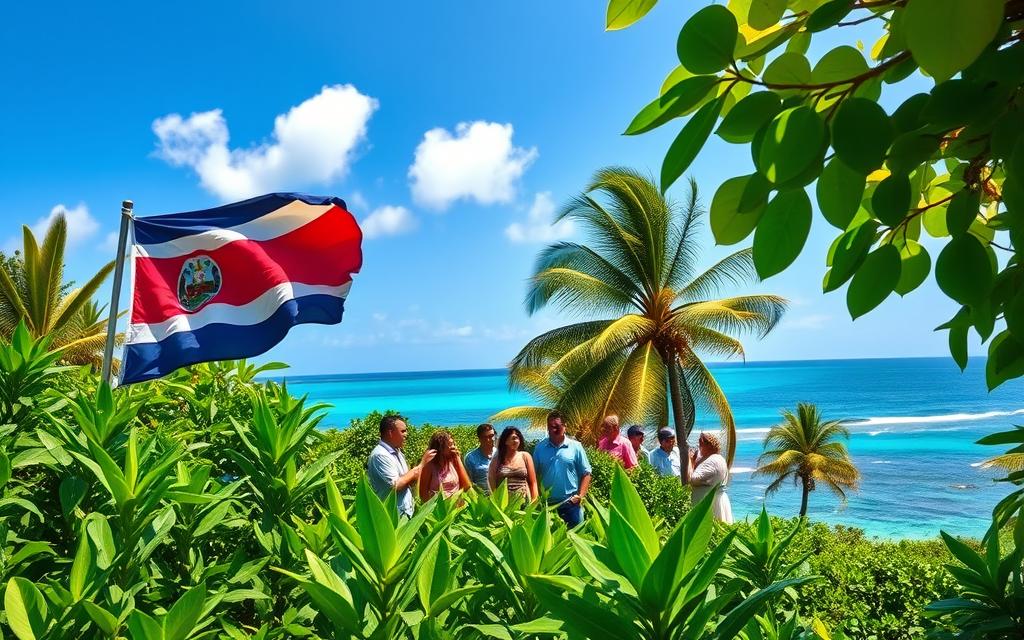What are the Language Requirements for Costa Rica Citizenship?

Residency in Costa Rica has become an attractive option for individuals and families seeking a better quality of life. This Central American country, known for its natural beauty and rich culture, has positioned itself as a desirable destination for those who wish to settle permanently or temporarily.
To become a citizen of Costa Rica, one must first be a legal resident. The main criteria for this include legal residency and continuous stay. For citizenship, you must be a legal resident for 7 years, although this period can be less for individuals from certain countries.
Understanding the language requirements is crucial for the naturalization process. We will guide you through the language proficiency standards required for becoming a Costa Rican citizen and highlight the importance of language in demonstrating commitment to integration into Costa Rican society.
Understanding Costa Rican Citizenship Pathways

The journey to becoming a Costa Rican citizen involves several routes, each with its own set of requirements and benefits. Costa Rica offers a variety of residency options to suit the needs and circumstances of applicants. Among the most common options are rentista residency, designed for those who have stable and sufficient income; investment residency, for those who wish to contribute to the development of the country through business investment; and permanent residency, which allows foreigners to live indefinitely in the country after meeting specific requirements established by law.
Overview of Citizenship Options in Costa Rica
There are multiple pathways to Costa Rican citizenship, including through residency, marriage to a Costa Rican citizen, and descent. For most foreigners, residency requires 7 years, while those from Spanish-speaking countries can apply after 5 years. Temporary residency can lead to permanent residency status, a prerequisite for citizenship application. Each pathway has specific requirements, but all share the common element of language proficiency assessment.
Why Language Proficiency Matters for Integration
Language proficiency is considered essential for true integration into Costa Rican society and culture. Speaking Spanish enables new citizens to participate fully in community life, access services, and contribute to the country's development. It reflects Costa Rica's commitment to ensuring new citizens can function effectively within society and demonstrates the applicant's commitment to becoming a genuine part of the Costa Rican community.
By understanding the various pathways and their requirements, individuals can better prepare themselves for the citizenship process, ultimately enriching their experience of becoming part of Costa Rica.
What are the Language Requirements for Costa Rica Citizenship?

Costa Rican citizenship requires applicants to meet specific language proficiency standards as part of the integration process. To get Costa Rican citizenship, you must not only fulfill certain legal and age rules but also demonstrate a good understanding of the Spanish language and Costa Rican culture. This is crucial for integrating into the community and contributing to the country's social fabric.
Official Spanish Language Proficiency Standards
The Spanish language test is a critical component of the citizenship application process. Applicants must demonstrate competency in reading, writing, speaking, and comprehending Spanish at a functional level. This means they should be able to communicate effectively in everyday situations and understand basic civic information. The language assessment is designed to ensure that applicants can function independently in Spanish within Costa Rican society.
The standards for language proficiency are set by Costa Rican immigration authorities, and while fluency is not expected, a practical working knowledge of Spanish is required. This allows applicants to integrate into daily life in Costa Rica. The assessment may be applied with some flexibility depending on the applicant's background and circumstances.
How Language Requirements Are Assessed
Language requirements are formally assessed through standardized testing administered by authorized government officials. The structure of the language assessment typically includes both written and oral components to evaluate comprehensive language skills. This ensures that applicants can communicate effectively and understand various aspects of Spanish, from basic conversations to civic information.
For more information on the citizenship process and its requirements, you can visit this resource, which provides detailed insights into the overall process of obtaining Costa Rican citizenship.
The Spanish Language Citizenship Test Explained

The path to Costa Rican citizenship involves demonstrating Spanish language skills through a comprehensive test. This assessment is crucial for ensuring that new citizens can integrate effectively into Costa Rican society. The test is part of a broader evaluation that includes knowledge of Costa Rican history, culture, and laws.
Format and Structure of the Language Exam
The Spanish language citizenship test is designed to assess various language skills. It typically consists of four main components: reading comprehension, writing exercises, listening comprehension, and an oral interview. The reading section tests the ability to understand written Spanish through passages about Costa Rican history, culture, and civic information. For instance, applicants may be asked to read a passage about Costa Rica's democratic government and then answer questions about it. More information on the citizenship process can be found on our website, which links to relevant resources such as Costa Rica Dual Citizenship.
Scoring Criteria and Passing Requirements
The scoring system for the Spanish language test evaluates functional communication skills rather than perfect grammar or accent. Examiners assess the ability to engage in conversation, understand various spoken dialects, and express ideas clearly in written Spanish. To pass, applicants must demonstrate a sufficient level of language proficiency. Those who fail can typically retake the test after a specified waiting period and additional preparation, allowing them to improve their language skills before reapplying.
Understanding the format and scoring criteria of the Spanish language citizenship test is essential for applicants to prepare effectively. By focusing on the required language skills and familiarizing themselves with the test structure, individuals can better navigate the citizenship process.
Preparing for the Spanish Language Test

Preparing for the Spanish language test is a vital part of the Costa Rican citizenship process, requiring dedication and the right resources. To succeed, applicants must demonstrate a strong command of Spanish, which is the official language of Costa Rica.
Recommended Study Resources and Materials
To prepare effectively for the Spanish language test, we recommend utilizing a variety of study resources and materials. These include textbooks that focus on Spanish grammar and vocabulary relevant to Costa Rican culture and civic life, online courses that offer interactive lessons, and language learning apps that provide flexible study options.
Practice tests are also invaluable, as they help applicants become familiar with the test format and content. Additionally, using flashcards can aid in memorizing key vocabulary and phrases. Immersion learning, such as watching Costa Rican TV shows or listening to local music, can also enhance language skills.
Language Schools and Tutoring Options in Costa Rica
Costa Rica offers numerous language schools and tutoring options that specialize in preparing students for the citizenship language test. These institutions provide structured learning environments and expert instructors who are knowledgeable about the test requirements.
Private tutoring is also available, offering personalized instruction tailored to an individual's specific language challenges. Furthermore, community resources and language exchange programs provide opportunities to practice Spanish in real-life contexts, which is essential for developing natural language fluency.
Cultural Knowledge Requirements Beyond Language

As we navigate the process of obtaining Costa Rican citizenship, it's essential to understand that cultural knowledge is just as vital as language proficiency. The citizenship test is designed to assess not only an applicant's ability to communicate in Spanish but also their understanding of Costa Rica's history, culture, and governmental structure.
Costa Rican History and Civics Component
The cultural knowledge component of the citizenship test covers a wide range of topics related to Costa Rica. Applicants are expected to demonstrate knowledge of key historical events, national symbols, and the country's democratic values. This includes understanding the significance of national holidays, famous historical figures, and the structure of the Costa Rican government.
How Cultural Knowledge Complements Language Skills
Cultural knowledge and language skills are interlinked in the citizenship process. Understanding the cultural context of Costa Rica enhances an individual's ability to communicate effectively and participate meaningfully in society. By demonstrating cultural knowledge, applicants show their ability to appreciate the context of language use and social norms, enabling them to connect more deeply with their new community.
Moreover, cultural integration demonstrates respect for Costa Rican heritage and traditions, which is viewed favorably in the citizenship process. To prepare, applicants can utilize resources such as museums, cultural centers, and community events to learn about Costa Rican culture.
Language Requirements for Different Citizenship Pathways
For those seeking Costa Rican citizenship, understanding the language requirements across different pathways is crucial. Costa Rica offers various routes to citizenship, including through residency, marriage, and descent, each with its own set of language proficiency expectations.
Requirements for Citizenship Through Residency
Individuals seeking citizenship through residency must first reside in Costa Rica for at least 7 years. During this period, they are expected to achieve a standard level of Spanish language proficiency, which is then formally assessed through a language test. This requirement ensures that new citizens can integrate into Costa Rican society effectively.
Requirements for Citizenship Through Marriage
For those applying for citizenship through marriage to a Costa Rican citizen, the residency requirement is reduced to 2 years after marriage. While the language requirement still applies, there can be some flexibility in how it is assessed, considering the applicant's integration into the local community through their spouse. Applicants must still demonstrate a reasonable level of Spanish proficiency.
Requirements for Citizenship Through Descent
Citizenship through descent is available to those with Costa Rican parents or grandparents. While the primary requirement is proving familial connection, having some proficiency in Spanish can be beneficial for fully embracing the cultural heritage. The language requirement may be less stringent compared to other pathways, but it's still an important aspect of integrating into Costa Rican society.
Regardless of the pathway chosen, some level of Spanish language ability is expected for all citizenship applicants. The residency period prior to the citizenship application provides ample time for language acquisition and integration. For instance, marriage to a Costa Rican citizen often naturally facilitates language learning through family interactions. To learn more about the dual citizenship laws in Costa Rica, you can visit our comprehensive guide on exploring dual citizenship laws.
Exemptions and Special Considerations
Applicants for Costa Rica citizenship may be eligible for exemptions or special considerations regarding the language proficiency test. We will outline the various exemptions and special considerations that may apply to language requirements for certain citizenship applicants in Costa Rica.
Age-Based Exemptions for Seniors
Applicants over 65 years of age are typically exempt from the formal language testing requirement, recognizing the challenges of language acquisition later in life. This age-based exemption is designed to facilitate the citizenship process for seniors. To qualify, applicants must provide documentation proving their age.
Special Considerations for Disabilities
The Costa Rican government provides reasonable accommodations for applicants with documented disabilities that may affect their language learning or testing abilities. These accommodations can include modified testing formats or extended time. While exemptions exist, some basic communication ability is still expected. Proper documentation of the condition is crucial for qualifying for special considerations.
These exemptions reflect Costa Rica's inclusive approach to citizenship while maintaining standards for integration. The Costa Rica Immigration Experts (CRIE) have over 20 years of experience helping individuals navigate the residency and citizenship process, making it smoother and increasing the chances of success.
Common Challenges and How to Overcome Them
English speakers often encounter specific hurdles when learning Spanish for Costa Rican citizenship. These challenges can range from linguistic difficulties to cultural barriers. Understanding these obstacles is the first step in overcoming them.
Typical Difficulties for English Speakers
English speakers may face challenges such as pronunciation difficulties, grammatical differences, and vocabulary acquisition when learning Spanish. Mastering Spanish verb conjugations, gender agreement, and the subjunctive mood can be particularly daunting. For instance, the use of the subjunctive mood in Spanish is not directly equivalent to any single grammatical structure in English, making it a challenging concept to grasp.
To learn more about the language requirements for Costa Rican residency, you can visit this resource for detailed information.
Strategies for Successful Language Acquisition
To overcome these challenges, learners can employ several strategies. Immersion techniques, such as watching Costa Rican movies, listening to local music, and engaging in conversations with native speakers, can significantly enhance language acquisition. Consistent practice routines, including regular study sessions and language exchange programs, are also effective.
Additionally, understanding the cultural context of Costa Rica can greatly aid in language learning. By familiarizing yourself with Costa Rican customs and traditions, you can better appreciate the nuances of the Spanish language as it's spoken in Costa Rica.
The Complete Citizenship Application Process
The journey to Costa Rican citizenship involves a thorough application process that requires careful preparation. To successfully navigate this process, it's essential to understand the various components involved and the steps required to complete the application.
Required Documentation and Submissions
To apply for Costa Rican citizenship, several key documents must be submitted. These include a copy of your birth certificate, proof of legal residency in Costa Rica for 5-7 years, police clearances from your home country and Costa Rica, evidence of financial self-sufficiency, character references from two individuals, and completed application forms. It's crucial that all documents are either in Spanish or officially translated into Spanish.
Additionally, many of these documents require authentication through apostille or legalization. Ensuring that your documents are properly prepared and submitted is vital to avoiding delays in the application process.
Timeline and Processing Expectations
The timeline for the citizenship application process can vary significantly, typically ranging from 6 months to 2 years from initial submission to final approval. During this period, your application will undergo several reviews, including background checks, document verification, and possibly interviews.
The language proficiency test is usually scheduled as part of the application review process. The results of this test can impact the overall timeline, so it's essential to prepare adequately to avoid delays.
Understanding the processing expectations and potential bottlenecks can help applicants prepare and potentially expedite their application. Being aware of the steps involved and the typical duration can reduce anxiety and help manage expectations throughout the process.
Conclusion
As we conclude our exploration of Costa Rica's citizenship requirements, it's clear that language proficiency plays a crucial role. The journey to becoming a Costa Rican citizen involves several steps, with language being a fundamental aspect.
We have summarized the key language requirements for Costa Rican citizenship and their importance in the overall naturalization process. While these requirements may seem challenging, they are essential for ensuring successful integration into Costa Rican society. The various pathways to citizenship, including residency and permanent residency, each have specific language requirements that applicants must meet.
Proper preparation for the language test is crucial, and starting language learning well before beginning the citizenship application process is highly recommended. Becoming proficient in Spanish not only aids in passing the citizenship test but also enhances the quality of life and deepens cultural connections in Costa Rica.
We encourage readers to view language acquisition as an investment in their future life in Costa Rica rather than merely a hurdle to overcome. For those seeking professional assistance with their residency and citizenship journey, our contact information is available: www.jaroscr.com, info@jaroscr.com, +(506)7182-8969.
In conclusion, while the path to Costa Rican citizenship requires effort, particularly regarding language proficiency, the rewards of becoming a citizen of this beautiful and peaceful country make the journey worthwhile. Costa Rica offers a variety of residency options, including rentista residency, investment residency, and permanent residency, each designed to suit different needs and circumstances.


